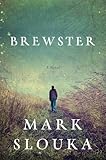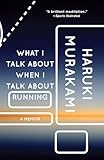 In this year’s Berlin Marathon, Kenya’s Wilson Kipsang set the marathon world record with a time of 2:03:23. Under the right conditions, and properly hydrated, I might be able to get through a short novel in that time. Reading, however, is most definitely not a race against the clock, and therefore I chose to honor Kipsang’s achievement by leisurely contemplating the most compelling portrait of a runner in recent years: Mark Slouka’s Brewster.
In this year’s Berlin Marathon, Kenya’s Wilson Kipsang set the marathon world record with a time of 2:03:23. Under the right conditions, and properly hydrated, I might be able to get through a short novel in that time. Reading, however, is most definitely not a race against the clock, and therefore I chose to honor Kipsang’s achievement by leisurely contemplating the most compelling portrait of a runner in recent years: Mark Slouka’s Brewster.
Among its other charms, Brewster provides a definitive, and lofty, answer to the question of whether or not running is a sport:
…foot racing is not a sport. Gladiatorial combat with the mace and the trident was not a sport. The Sun Dance of the Plains Indians was not a sport. Foot racing is a conviction, a calling. You think Geronimo would have joined the basketball team? You think Thomas Jefferson would be doing layups? No! Jefferson would have been a miler!
It gives me great pleasure to picture the Apostle of Democracy doing quarter-mile repeats on the lawn of Monticello, perhaps in preparation for a match race with his Federalist challenger John Adams at the Founding Fathers Relays.
But I digress.
 Brewster is less a running novel than a novel with a running subplot — for the former, see John L. Parker Jr.’s cult classic Once a Runner. And yet running is vital to the way Jon Mosher, its young hero and a member of the track team, learns to see the world: “I wanted to hurt in a way I understood.” While his track coach mentions “moral fiber” and regular bowel movements as two benefits of running — what more could a teenager want? — he undersells the intensely personal significance of the sport, or rather, the “calling.” For Jon, the benefits extend beyond digestive regularity:
Brewster is less a running novel than a novel with a running subplot — for the former, see John L. Parker Jr.’s cult classic Once a Runner. And yet running is vital to the way Jon Mosher, its young hero and a member of the track team, learns to see the world: “I wanted to hurt in a way I understood.” While his track coach mentions “moral fiber” and regular bowel movements as two benefits of running — what more could a teenager want? — he undersells the intensely personal significance of the sport, or rather, the “calling.” For Jon, the benefits extend beyond digestive regularity:
I wasn’t the only one who brought to it more than it could bear. It had a way of doing that, of convincing you it was more than it was — not a stage but the world, not war by other means but war itself. That it mattered.
 Brewster is particularly good at demonstrating how a repetitive act of masochism — paying “the piper of pain” — becomes a kind of ritual cleansing: “…you know this fire better than anybody, because the hotter it burns the higher you’ll build it, because you’ll walk into that furnace and sit on the couch.” (Haruki Murakami’s leaden and ruminative What I Talk About When I Talk About Running could have used a blast of such heat.)
Brewster is particularly good at demonstrating how a repetitive act of masochism — paying “the piper of pain” — becomes a kind of ritual cleansing: “…you know this fire better than anybody, because the hotter it burns the higher you’ll build it, because you’ll walk into that furnace and sit on the couch.” (Haruki Murakami’s leaden and ruminative What I Talk About When I Talk About Running could have used a blast of such heat.)
Pain abounds in the novel, even before Jon joins the team and the workouts start. Jon was four when his brother accidentally electrocuted himself. His mother has been in trance ever since, though she occasionally revives to show scorn for her surviving son. Jon’s best friend, Ray, is a charismatic brawler whose monstrous father beats him savagely. There’s animal cruelty, some gruesome souvenirs from WWII, attempted rape, plenty of schoolyard fights, and the intensifying Vietnam War looming on the post-graduation horizon. All of this makes for a sensational — though stylistically restrained — tale of late-1960s teenage angst in Brewster, NY, a town whose scenery seems as if it “had been rubbed with an old eraser.”
And then comes a different kind of pain: track repeats, those displays of “sustained power that looked like nothing but felt like murder.” Jon joins the team reluctantly, then embraces the way it allows him to “suffer [his] way to grace” amidst the intermittent violence and apathy that define his high-school experience. From his disastrous first time-trial, after which he vomits his lunch on the infield — “‘Fuckin’ Sloppy Joes, man,'[he] heard someone say, almost respectfully” — he gradually improves to become a member of the 4×800 team.
Like most coming-of-age tales, Brewster is about the intensity of teenage experience, the blessed (or cursed) ability of the young to focus exclusively on what’s right in front of them: “I’d be a liar if I said that Gina’s nipples meant less to us than the Tet Offensive. We were sixteen.” For these kids, Vietnam doesn’t matter (until it does), and the slow leg on their relay breaking 2:10 for 800 meters feels more momentous than the little concert happening up the road in Woodstock.
Slouka does justice to the quiet intensity of the racing ceremony. A sprinter “fold[s] himself like a supple jackknife into the blocks,” while a half-miler crouches at the start, “the lane narrowing like a dagger.” He nicely conveys the sense of reverence inspired by large venues such as Manhattan’s 168th Street Armory, which becomes an acridly perfumed temple: “…substitute the smell of heat rub for incense and you’ve got it.” And Slouka captures the peculiarly isolating feeling of being on a relay team (“a cult of individuals”) in the moments before the gun goes off:
You’re sitting down to pull off your sweats because you’re too nervous to trust your balance, you’re watching your lead-off man walk to the line like a lamb to the slaughter, adjusting his shorts, fiddling with the baton, but you’re not really there. You’re huddled in a cave with your heart, listening to its boom. The noises of the outside world are coming from somewhere far above you.
Here is the ritual strangeness of relays viscerally represented — Jon distractedly watching a team member being initiated into racing’s mysteries as he awaits his own trial.
Jon and his friends eventually undergo trials with more serious stakes: appalling violence, family tragedy, poverty, and war. Early on Jon explains that living in Brewster feels like “somebody twice as strong as you had their hand around your throat. You could choke or fight.” There is a sense that for these kids, the race is rigged, which makes their conviction all the more stirring: “So what if we’d lost? Fuck it. We’d run it anyway. We’d run it like it mattered.”
Brewster may not be a pure running novel, but it certainly treats the calling like it mattered.
And now, to work on my Founding Fathers Relays fan fiction…








